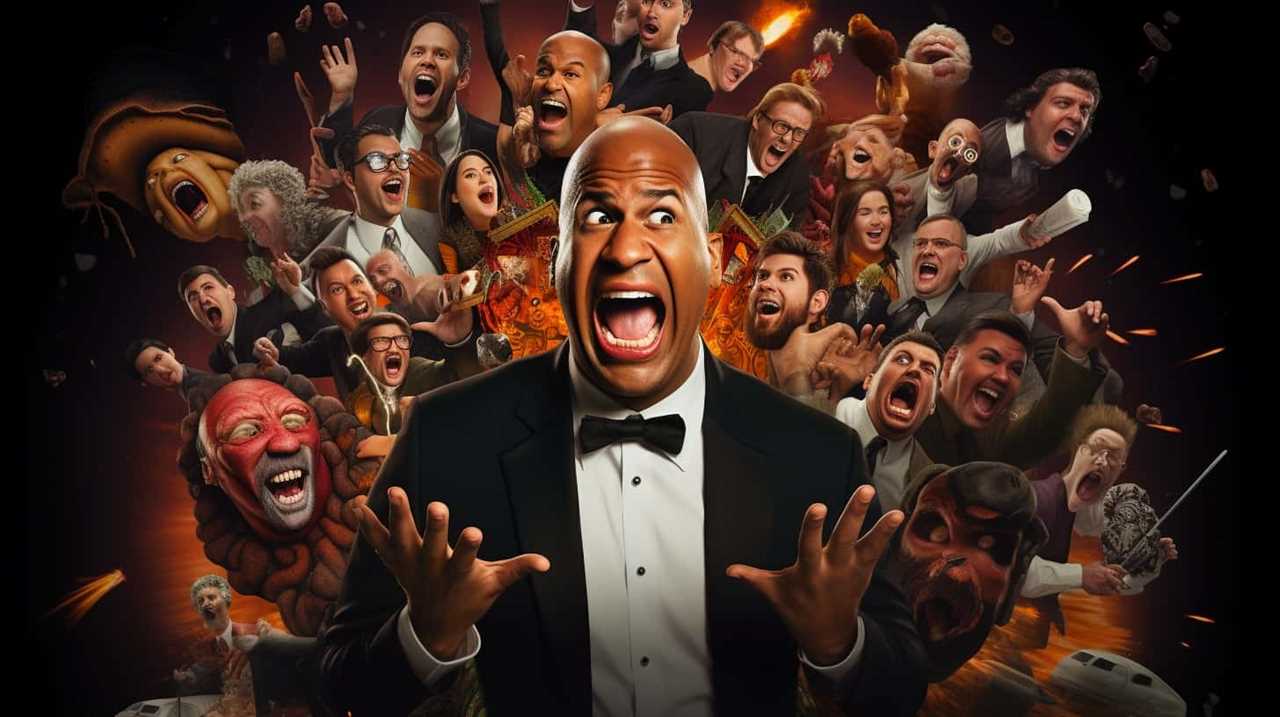Are you tired of the same old TV dramas with predictable storylines and lackluster performances?
Well, look no further! We have curated a list of the greatest dramatic TV monologues that are sure to captivate and inspire you.
From Walter White’s mesmerizing transformation in Breaking Bad to Tyrion Lannister’s powerful speech on power in Game of Thrones, these monologues push the boundaries of innovation and storytelling.
Don’t expect generic characters and cliché dialogue here. Instead, brace yourself for riveting performances that will leave you on the edge of your seat.

So, if you’re ready to indulge in the brilliance of television’s finest dramatic monologues, join us as we explore the extraordinary world of these captivating performances.
Key Takeaways
- Dramatic TV monologues have the power to showcase the transformation and moral ambiguity of characters, such as Walter White in Breaking Bad and Tony Soprano in The Sopranos.
- Effective storytelling in monologues can evoke deep emotions and create a lasting impact on the audience, as seen in Don Draper’s Carousel pitch in Mad Men.
- Persuasive delivery and storytelling in monologues can sway opinions and change behavior, exemplified by Don Draper’s Carousel pitch.
- Monologues can challenge power dynamics and inspire audiences to question corruption and rise above deceit, as demonstrated by Olivia Pope’s monologue in Scandal.
Walter White’s Transformation in Breaking Bad
In Breaking Bad, Walter White’s transformation from a mild-mannered high school chemistry teacher to a ruthless drug lord is an astonishing portrayal of a character’s descent into darkness. Walter’s descent into the criminal underworld is marked by moral ambiguity, blurring the lines between right and wrong. As viewers, we’re forced to confront our own perceptions of morality and question the boundaries of good and evil.
Throughout the series, Walter’s journey is a constant tug-of-war between his initial intentions of providing for his family and the lust for power that ultimately consumes him. We see him make increasingly questionable decisions, each one pushing him further down a path of darkness. What makes Walter’s transformation so compelling is the way his actions are justified in his own mind, highlighting the complexity of human nature and the potential for darkness that lies within us all.
Breaking Bad challenges our conventional notions of morality, forcing us to confront the uncomfortable reality that good people are capable of terrible things. It explores the gray areas of human behavior, highlighting the moral ambiguity that exists in our society. Walter White’s descent into darkness serves as a cautionary tale, reminding us of the potential consequences of succumbing to our darkest desires.

Transitioning into the subsequent section about Tyrion Lannister’s speech on power in Game of Thrones, we can draw parallels between the moral ambiguity explored in Breaking Bad and the complex nature of power in the world of Westeros.
Tyrion Lannister’s Speech on Power in Game of Thrones
Tyrion Lannister’s speech on power in Game of Thrones offers a profound reflection on the complexities and pitfalls inherent in wielding authority. In this motivational speech, Tyrion, played brilliantly by Peter Dinklage, imparts wisdom that resonates far beyond the fictional world of Westeros. He says, ‘Power resides where men believe it resides. It’s a trick, a shadow on the wall, and a very small man can cast a very large shadow.’ These words encapsulate the essence of Tyrion’s character and his understanding of power dynamics.
Tyrion’s speech highlights the importance of perception in the exercise of power. He recognizes that power isn’t solely based on physical strength or stature, but rather on the perception others have of it. Through his own experiences as a dwarf in a world that often marginalizes him, Tyrion has learned to leverage his intellect and wit to exert influence and navigate treacherous political landscapes.
This motivational speech also mirrors the impact of Don Draper’s pitch in Mad Men. Both moments showcase the power of words and storytelling to shape perceptions and evoke emotions. Tyrion’s speech is a reminder that true power lies not in brute force, but in the ability to inspire and unite others towards a common goal. It challenges conventional notions of power and encourages us to question the systems and structures that perpetuate inequality and oppression.
Tyrion Lannister’s speech on power in Game of Thrones is a masterclass in effective communication and strategic thinking. It reminds us that true power isn’t about domination, but about empowering others and leveraging our unique strengths to effect positive change.
Don Draper’s Carousel Pitch in Mad Men
When it comes to discussing the greatest dramatic TV monologues, it would be remiss not to mention Don Draper’s iconic Carousel pitch in Mad Men.
This pitch not only showcases the emotional impact of the Carousel, a slide projector, but also highlights Draper’s persuasive delivery. Through his masterful storytelling and ability to tap into deep emotions, Draper captivates his audience and leaves a lasting impression.
His pitch serves as a reminder of the power of effective communication and the art of selling an idea.

Carousel’s Emotional Impact
Don Draper’s Carousel pitch in Mad Men is a prime example of a TV monologue that delivers a profound emotional impact. This powerful scene takes viewers on an emotional rollercoaster, leaving them with a deep connection to the characters and a lasting impression. Here’s why this monologue is so impactful:
- Emotional Rollercoaster:
- Don Draper’s pitch takes us on a journey through nostalgia, evoking feelings of both joy and sadness.
- The contrast between the happy memories captured by the Carousel and the underlying pain in Don’s personal life creates a powerful emotional juxtaposition.
- The monologue forces us to confront our own emotions, reminding us of the bittersweet nature of life.
- Connection with Characters:
- Don’s vulnerability and honesty in this pitch allow us to see him in a new light, deepening our connection with him as a character.
- The way the monologue reveals Don’s inner struggles and desires makes us empathize with his complex journey.
- Through this pitch, we not only connect with Don but also reflect on our own experiences and the significance of memories in our lives.
Don Draper’s Carousel pitch is a testament to the emotional impact that a well-crafted TV monologue can have. It not only captivates the audience but also encourages introspection and a deeper understanding of the human experience.
Don Draper’s Persuasive Delivery
One of the most persuasive deliveries in a dramatic TV monologue is seen in the Carousel pitch by Don Draper in Mad Men. Don Draper, played by Jon Hamm, is known for his advertising genius and his ability to captivate audiences with his words. The Carousel pitch is a prime example of his persuasive storytelling skills, showcasing the power of emotional connection in advertising.
In this memorable scene, Don Draper presents a slide projector that brings back nostalgic memories of families and happy moments. As the images flicker on the screen, he masterfully weaves a narrative that tugs at the heartstrings of his clients. The audience is drawn into his world, feeling the deep longing and yearning for the past that he describes.

| Don Draper’s Advertising Genius | The power of persuasive storytelling |
Don Draper’s advertising genius lies in his ability to tap into the emotions of his audience. He understands that people connect with stories that resonate with their own experiences, and he uses this knowledge to create compelling narratives that leave a lasting impact. The Carousel pitch is a testament to his talent, as he effortlessly combines visuals, words, and emotions to sell a product.
The power of persuasive storytelling cannot be underestimated. It has the ability to sway opinions, change behavior, and create a lasting impression. Don Draper’s Carousel pitch is a prime example of this, as it not only sells a slide projector but also evokes a deep sense of nostalgia and longing in the audience. By tapping into their emotions, he creates a connection that goes beyond the product itself. This is the essence of persuasive advertising and the mark of a true advertising genius like Don Draper.
Tony Soprano’s Therapy Sessions in The Sopranos
While exploring the greatest dramatic TV monologues, we delve into Tony Soprano’s therapy sessions in The Sopranos. These intense one-on-one sessions between Tony and his therapist, Dr. Jennifer Melfi, provide a unique perspective into the mind of a complex character like Tony Soprano.
Here are three reasons why Tony’s therapy sessions are worth exploring:
- Tony Soprano’s therapist perspective: Dr. Melfi’s role as Tony’s therapist allows us to witness his inner struggles and conflicts. Through her probing questions and insightful analysis, we gain a deeper understanding of Tony’s motivations, fears, and vulnerabilities. It’s through these therapy sessions that we see Tony confront his own demons and attempt to navigate the morally ambiguous world he inhabits.
- The impact of Walter White’s actions: Tony Soprano’s therapy sessions provide a compelling contrast to another iconic TV character, Walter White from Breaking Bad. While Walter descends into darkness and embraces his criminal activities, Tony grapples with his own moral compass. Tony’s therapy sessions offer an introspective exploration of the consequences of one’s actions and the potential for redemption.
- Psychological depth and character development: The therapy sessions in The Sopranos serve as a vehicle for character development and psychological depth. They expose Tony’s vulnerability and humanize a character who’s often portrayed as a ruthless mob boss. These sessions allow us to witness Tony’s struggles with anxiety, depression, and his complex relationships, adding layers to his already intricate personality.
Olivia Pope’s Monologue on Being a Gladiator in Scandal
Olivia Pope’s impassioned monologue in Scandal offers a powerful reflection on the essence of being a gladiator. As we delve into her words, we are reminded of the gladiators’ role in ancient Rome, where they were seen as fierce warriors who fought for their lives in the arena. In Scandal, being a gladiator takes on a metaphorical meaning, representing those who fight for justice in the complex and ruthless world of politics.
To fully grasp the significance of Olivia Pope’s monologue, let’s examine the power dynamics in Scandal’s political landscape. The table below illustrates the key players and their positions of influence:
| Character | Position |
|---|---|
| Olivia Pope | Crisis Manager |
| President Grant | Commander-in-Chief |
| Mellie Grant | First Lady |
| Cyrus Beene | Chief of Staff |
In this high-stakes game, Olivia Pope embodies the gladiator spirit, navigating the treacherous waters of scandal and manipulation. Her monologue serves as a rallying cry, reminding us of the importance of standing up for what is right, even in the face of overwhelming odds.
Through her words, Olivia Pope challenges the status quo, inspiring us to question the power dynamics that often dictate our lives. She reminds us that being a gladiator means fighting for justice, even when it seems impossible. In a world where corruption and deceit run rampant, Olivia Pope’s monologue serves as a beacon of hope, urging us to rise above the chaos and embrace our inner gladiator.

The Doctor’s Regeneration Speech in Doctor Who
The Doctor’s regeneration speech in Doctor Who is a powerful moment that showcases the impact of a well-delivered monologue. It not only captures the attention of the audience but also creates an emotional connection that resonates long after the episode ends.
The Doctor’s ability to convey a range of emotions and reflect on their past experiences adds depth and complexity to the character, making the monologue a standout moment in the show’s history.
Impact of Monologue
Our favorite dramatic TV monologue, The Doctor’s Regeneration Speech in Doctor Who, has left a lasting impact on viewers. The psychological impact of this monologue can’t be overstated. It explores the profound emotions of loss, transformation, and the constant cycle of life and death. The Doctor’s words resonate deeply with the audience, evoking a range of emotions from sadness to hope.
The artistic interpretation of the monologue is also remarkable. The eloquence and poetic nature of the speech captivate viewers, drawing them into the Doctor’s world and allowing them to empathize with his experiences. The monologue is a masterclass in storytelling, seamlessly blending science fiction with profound philosophical themes.

Emotional Connection With Audience
During the Doctor’s Regeneration Speech in Doctor Who, we were deeply moved by the emotional connection established with the audience. The personal connection felt between the Doctor and the viewers was truly remarkable.
As the Doctor bid farewell and prepared for his regeneration, his words resonated with a raw and profound emotional resonance. The speech was filled with vulnerability, as the Doctor expressed his fears, regrets, and hopes for the future. The audience was able to empathize with the Doctor’s journey and experience a sense of shared emotion.
This emotional connection allowed the viewers to feel a part of the story, forging a bond that transcended the screen. The Doctor’s Regeneration Speech is a testament to the power of storytelling and its ability to create a deep and lasting impact on its audience.
As we transition to discussing Frank Underwood’s address to the audience in House of Cards, we find another example of a character establishing a direct connection with viewers.
Frank Underwood’s Address to the Audience in House of Cards
In House of Cards, one of the most memorable and impactful dramatic TV monologues is Frank Underwood’s address to the audience. This monologue exemplifies Frank Underwood’s manipulation tactics and showcases the power of breaking the fourth wall.
Here are three reasons why this address to the audience is so significant:
- Unique Connection: Frank’s direct address to the audience breaks the traditional boundaries of television, creating a unique connection between the character and the viewers. By acknowledging their presence, he invites them into his world and allows them to become complicit in his schemes. This innovative approach adds an extra layer of engagement and immersion to the viewing experience.
- Insight into Manipulation: Through his address to the audience, Frank Underwood reveals his true nature as a master manipulator. He shares his inner thoughts, motivations, and strategies, giving the audience an intimate look into his Machiavellian mindset. This transparency allows viewers to witness firsthand the tactics he employs to achieve his goals, offering a fascinating exploration of power dynamics and manipulation.
- Breaking the Fourth Wall: By breaking the fourth wall, Frank Underwood gains control over the narrative and becomes the ultimate puppeteer. He uses this technique to manipulate not only the characters within the show but also the audience themselves. This boundary-breaking approach challenges traditional storytelling conventions and keeps viewers on their toes, constantly questioning their own role in the unfolding drama.
Norma Bates’ Confession in Bates Motel
Norma Bates’ confession in Bates Motel further adds to the collection of impactful and memorable dramatic TV monologues, continuing the exploration of unique connections between characters and viewers. Norma Bates’ psychological journey is a fascinating and complex one, and her confession scene showcases the depth of her character and the intricate web of emotions she experiences.
Throughout the series, we witness the evolution of Norma Bates’ complex relationship with her son, Norman. Their bond is both tender and troubling, marked by a mixture of love, dependency, and a constant struggle for control. Norma’s confession becomes a pivotal moment in their dynamic, as she lays bare her deepest fears, secrets, and vulnerabilities.

In this monologue, Norma’s raw emotions are palpable, as she confronts her own actions and acknowledges the darkness within her. The audience is drawn into her inner turmoil, experiencing her pain, guilt, and desperation. As viewers, we’re forced to grapple with the complexity of Norma’s character, questioning our own perceptions and judgments.
Norma Bates’ confession in Bates Motel is a prime example of how a well-crafted monologue can provide insight into a character’s psyche and deepen our understanding of their motivations. It challenges us to empathize with flawed individuals and raises thought-provoking questions about the nature of love, identity, and the blurred lines between good and evil.
With Norma Bates’ confession serving as a powerful example of a dramatic TV monologue, we now turn our attention to another remarkable speech: Alicia Florrick’s opening statement in The Good Wife.
Alicia Florrick’s Opening Statement in The Good Wife
Alicia Florrick’s opening statement in The Good Wife is undeniably one of the most impactful courtroom monologues in television history.

From the moment she steps into the courtroom, the audience is captivated by Julianna Margulies’ incredible acting, as she flawlessly delivers a speech that showcases the complexities of the legal system and the emotional weight of the case.
This memorable moment not only highlights the brilliance of Margulies’ performance but also solidifies The Good Wife as a must-watch legal drama.
Impactful Courtroom Monologue
During the impactful courtroom monologue in The Good Wife, our attention is captured by Alicia Florrick’s powerful opening statement.
Alicia’s opening statement in the courtroom is a masterclass in delivering impactful closing arguments. Her words are carefully crafted and delivered with precision, leaving a lasting impact on the jury and the audience.

The emotional impact of witness testimonies adds another layer of intensity to Alicia’s monologue. As she weaves together the stories and experiences of the witnesses, she paints a vivid picture that resonates with the jurors’ emotions, making her argument even more compelling.
Alicia’s ability to connect with the jury and evoke empathy is truly innovative. She uses innovative storytelling techniques and incorporates personal anecdotes to humanize her client and make the case relatable to the jury.
With Alicia Florrick’s opening statement, the stage is set for the acting brilliance on display in The Good Wife.
Acting Brilliance on Display
In this remarkable display of acting brilliance, we are captivated by the power and precision of Alicia Florrick’s opening statement in The Good Wife. Through her masterful execution, Julianna Margulies brings to life the character of Alicia Florrick, a determined and intelligent lawyer fighting for justice.

Margulies employs a range of acting techniques to convey Alicia’s emotions and convictions. Her use of vocal modulation and body language effectively communicates Alicia’s confidence and determination. As she delivers her opening statement, Margulies skillfully embodies Alicia’s unwavering belief in her client’s innocence.
This powerful monologue not only showcases Margulies’ acting prowess but also highlights the depth of character development in The Good Wife. Alicia Florrick’s journey from a betrayed wife to a resilient and respected attorney is brought to life through Margulies’ nuanced performance.
| Acting Techniques | Character Development |
|---|---|
| Vocal modulation | Alicia’s confidence |
| Body language | Alicia’s determination |
| Conviction | Alicia’s belief |
Memorable Legal Drama Moment
Continuing the discussion from the previous subtopic, we were captivated by the power and precision of Alicia Florrick’s opening statement in The Good Wife, a memorable legal drama moment that showcases the brilliance of Margulies’ acting.
As we delve into the world of legal dramas on TV, it’s important to acknowledge the impact of landmark legal cases that have shaped the genre. These cases, such as the O.J. Simpson trial or the Watergate scandal, haven’t only provided gripping storylines but have also sparked important conversations about justice and the legal system.

The evolution of legal dramas on TV has been remarkable, as they’ve become more nuanced, complex, and realistic over the years. From Perry Mason to Law & Order, these shows have pushed the boundaries of storytelling, captivating audiences with their intricate plots and multidimensional characters.
Alicia Florrick’s opening statement in The Good Wife is a prime example of the incredible moments that legal dramas can deliver, reminding us of the power of words in the courtroom.
Elliot Alderson’s Rant in Mr. Robot
One of the most powerful dramatic TV monologues is Elliot Alderson’s rant in Mr. Robot. In this gripping scene, Elliot, played by Rami Malek, breaks the fourth wall and directly addresses the audience, providing us with a unique insight into his troubled mental state.
As he delves into his inner thoughts, we’re invited into the chaotic world of a brilliant but tormented hacker.

Elliot’s monologue is a masterclass in storytelling and character development. Through his impassioned words, we witness his struggle with reality, his isolation, and his desire to make a difference in a society he sees as deeply flawed. The raw emotion in his voice, combined with the intensity of his delivery, captivates us and leaves a lasting impact.
What makes Elliot’s rant even more remarkable is the way it challenges traditional television norms. By breaking the fourth wall, Mr. Robot pushes the boundaries of storytelling and engages the audience in a way that’s both innovative and immersive. We become active participants in Elliot’s journey, sharing in his pain, confusion, and determination.
As we explore the depths of Elliot’s mind, we’re reminded of the power of television to shed light on mental health issues and foster empathy. His struggles with identity and mental illness resonate with many, and the raw authenticity of his performance brings these issues to the forefront.
Transitioning to our subsequent section, another notable TV moment that tackles mental health is Carrie Mathison’s bipolar revelation in Homeland.

Carrie Mathison’s Bipolar Revelation in Homeland
Transitioning from Elliot Alderson’s rant in Mr. Robot, let’s now delve into the impactful moment of Carrie Mathison’s bipolar revelation in Homeland. The portrayal of Carrie Mathison’s struggle with bipolar disorder in Homeland is a testament to the show’s commitment to realistic and nuanced character development. Here are three reasons why this moment stands out:
- Raw Vulnerability: When Carrie finally reveals her diagnosis to her colleagues and loved ones, it’s a deeply emotional and raw moment. We witness her vulnerability and the weight of her secret being lifted, allowing for a deeper understanding of her character and the challenges she faces.
- Breaking Bad’s Character Development: Carrie’s bipolar revelation parallels the character development seen in Breaking Bad. Just as Walter White’s transformation from a mild-mannered chemistry teacher to a ruthless drug lord captivated audiences, Carrie’s revelation adds a new layer to her character, making her even more complex and compelling.
- Challenging Mental Health Stigma: By depicting Carrie’s struggle with bipolar disorder, Homeland shines a light on mental health and challenges the stigma surrounding it. This portrayal not only educates the audience about bipolar disorder but also encourages empathy and understanding towards those who face similar challenges in real life.
Carrie Mathison’s bipolar revelation in Homeland is a pivotal moment that showcases the show’s commitment to exploring complex characters and addressing important social issues. It stands as a testament to the power of television in fostering empathy and understanding.
Frequently Asked Questions
How Does Walter White’s Transformation in Breaking Bad Impact the Overall Storyline of the Show?
Walter White’s transformation in Breaking Bad has a profound impact on the overall storyline of the show. His actions, driven by moral ambiguity, drive the narrative forward and challenge viewers to question their own ethics.
What Is the Significance of Tyrion Lannister’s Speech on Power in Game of Thrones?
Tyrion Lannister’s speech on power in Game of Thrones is a masterclass in dramatic monologues. Its significance lies in its ability to captivate and challenge the audience, forcing us to question our own beliefs and perceptions. It leaves a lasting impact on all who hear it.

How Does Don Draper’s Carousel Pitch in Mad Men Showcase His Character Development Throughout the Series?
Don Draper’s growth is exemplified through his Carousel pitch in Mad Men. The monologue showcases his evolution from a troubled, secretive man to one who finds solace in his past and embraces his true identity.
What Insights Do We Gain About Tony Soprano’s Character Through His Therapy Sessions in the Sopranos?
In Tony Soprano’s therapy sessions, we gain deep insights into his character. Through his struggles, vulnerabilities, and inner conflicts, we witness the complex layers of a mob boss grappling with his personal demons.
How Does Olivia Pope’s Monologue on Being a Gladiator in Scandal Reflect the Show’s Themes and Narrative Arc?
Olivia Pope’s monologue in Scandal offers a powerful exploration of identity and its role in the show’s themes. Through her words, we gain insight into power dynamics and are compelled to reassess our perceptions.
Can Heart-Wrenching Drama Monologues Also Be Considered as the Greatest Dramatic TV Monologues?
Yes, heartwrenching drama monologues can certainly be considered as the greatest dramatic TV monologues. The raw emotion and intensity that these monologues convey are often what makes them memorable and impactful. They have the power to captivate audiences and leave a lasting impression.
Conclusion
After analyzing the greatest dramatic TV monologues, it becomes clear that these moments aren’t just mere dialogues, but powerful displays of emotion and storytelling.
From Walter White’s chilling transformation in Breaking Bad to Carrie Mathison’s revealing struggle with bipolar disorder in Homeland, each monologue captivates the audience and leaves a lasting impact.
These performances are like brushstrokes on a canvas, painting vivid images of the characters’ journeys, and reminding us of the incredible power of television storytelling.








